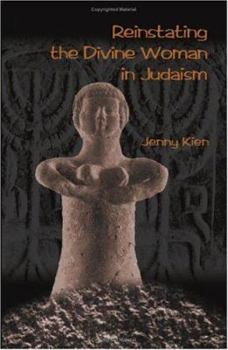Reinstating the Divine Woman in Judaism
A GODDESS FOR WOMEN'S PRAYERS Goddesses in ancient religions were particularly significant for women's physical, social and spiritual well-being. Yet, the Divine Woman was discarded by the... This description may be from another edition of this product.
Format:Paperback
Language:English
ISBN:1581127634
ISBN13:9781581127638
Release Date:January 2000
Publisher:Universal Publishers
Length:288 Pages
Weight:0.85 lbs.
Dimensions:0.7" x 5.7" x 8.6"
Customer Reviews
2 ratings
Synagogues for the Goddess
Published by Thriftbooks.com User , 23 years ago
Jenny Kien has written the book I have been searching for. She has addressed my dilemma -- that of a woman of Jewish heritage who has been turned off by her patriarchal religion, found a home in women's spirituality and the Goddess, and yet is still "Jewish." Since finding the Goddess, I have been struggling with how to reconcile my need for a Divine Female with my Jewishness, and Kien has provided a great many answers. But this book is not for Jews only. As the Jewish Bible/Old Testament is the foundation of the Christian Bible/New Testament, finding the Goddess as She is buried in the Jewish Bible also strengthens the idea of the Divine Woman in Christianity. Kien has looked at the beginnings of the old Israelite religion; studied the cultures which existed in what we now call the Middle East in the era when the Hebrew tribes were coalescing; and traced how the Goddess was demoted from the all-encompassing mother to becoming almost non-existent.She has followed how the idea of one male God, Jahweh, emerged and eventually took over -- banishing the Goddess in the process, although the old Israelite religion was polytheistic throughout its early days. Tackling the issue of monotheism Kien wishes that amongst the many strands of Judaism today ( e.g. Orthodox, Hassidic, Conservative, Reform, Reconstructionist, and most recently the emergence of Jewish Renewal) there could be a place for a "polytheistic strand in which people could choose to focus their worship on Goddess, God, or both." Kien's work is situated within the parameters of current feminist and women's spirituality thinking, and she feels that the "age-old struggle between monotheistic Judaism and the goddess is nothing less than men's battle against women's sexuality." How does one reclaim the concept of a Divine Female within the framework of Judaism, and still have Judaism? Based on the long tradition of individuals studying, interpreting, and commenting on the Torah, Kien states that Judaism has no dogma and therefore no theology, and that "it is the work and the responsibility of the individual to determine and develop her/his own interpretation of the texts." Staying within this tradition, Kien therefore believes that women not only can but also must reclaim these texts, and reveal the goddess within them and within Judaism. Women can create their own midrashim or interpretive stories, invent rituals to express their needs, and reclaim the yearly festivals to mark what is important in women's lives. We must also create new synagogue services to incorporate the Divine Woman, as it is not enough to say the traditional prayers with the God language rewritten in the feminine gender. Reinstating the Divine Woman in Judaism presents us with a well-developed thesis that a Divine Woman has been present since the beginning of what became Judaism, and that it is time to reinstate Her in our practices.
When things are not as they seem
Published by Thriftbooks.com User , 23 years ago
This book offers a wide range of thought provoking ideas on the early development of Judaism, in particular, the role played by women during this period. The author proves that the contemporary role of women in mainstream Judaism is certainly not as it has always been by providing a variety of examples in which women were once central to and powerful figures in the religion and its practise. These female figures include priestesses, who held dominant positions in organised religious activities and goddesses, who equalled or dominated over the typical male god figure. One of the most interesting parts of this book is a detailed textual analysis of well-known stories from the Old Testament. In these analyses, the author demonstrates that traditional interpretations of these stories derive from translations of biblical texts which were written in a patriarchal environment. The author offers alternative translations which radically transform these stories and remove their often misogynistic meanings. Ultimately, this book challenges the reader to be aware of the patriarchal context in which contemporary, mainstream religious values and institutions have developed and to go behind this interpretive layer to gain a new appreciation and understanding of the religion (and indeed modern, western society generally).





